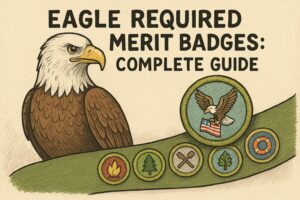To earn the Eagle Scout rank, you must complete 14 specific merit badges. These badges cover citizenship, safety, fitness, and outdoor skills. While most of them are required for everyone, a few let you choose between options. This guide breaks down each badge, gives you helpful tips, and links to full pathtoeagle.org guides.
Use this page to track your progress and decide which options are best for you. You can use this FREE downloadable and printable checklist to keep track of your progress!
Citizenship Badges (You Must Earn All 4)
Citizenship in Society
This badge asks you to think about fairness, respect, and understanding others. You’ll reflect on what it means to be a good citizen in today’s world.
Why it matters:
It helps you grow as a leader and a friend. There’s no set rank requirement, but many Scouts complete it as older teens.
Citizenship in the Nation
Learn how the U.S. government works. You’ll explore historical documents, national landmarks, and your role as a citizen.
Why it matters:
You’ll understand the freedoms you enjoy and how to protect them.
Citizenship in the World
This global citizenship badge covers how countries work together and how you can be a global citizen.
Why it matters:
It opens your eyes to world events and the power of cooperation.
Citizenship in the Community
This one focuses on your local area. You’ll attend a meeting and volunteer in your town.
Why it matters:
You’ll see how small actions can make a big difference close to home.
Personal Growth and Preparedness (All Are Required)
First Aid
You’ll learn how to treat injuries, handle emergencies, and respond with confidence.
Pro tip:
These are skills every Scout should know from the start.
Communication
This badge teaches public speaking, listening, and how to share ideas clearly.
Pro tip:
Great for Scouts in leadership positions or planning an Eagle project.
Personal Fitness
You’ll build a health plan, track your progress for 12 weeks, and improve your fitness.
Pro tip:
Start early! The tracking takes time and commitment.
Personal Management
You’ll create a budget, track your spending, and learn about long-term goals.
Pro tip:
It’s one of the most useful badges for real-life skills.
Choose One: Swimming, Hiking, or Cycling
You must earn just one of these three. Each has its own benefits.
Swimming (My choice)
Covers survival strokes, water safety, and basic rescues.
Pros:
- Often taught at summer camp
- Useful if you’re confident in the water
Cons:
- Not ideal if swimming makes you nervous
- May not be available year-round
Hiking
You’ll complete five long hikes, including one that’s 20 miles in a single day.
Pros:
- Builds stamina
- Flexible to schedule on your own
Cons:
- Physically tough
- Takes time to plan routes
Cycling
Ride 10 to 50 miles while learning bike safety and maintenance.
Pros:
- Fun if you love biking
- Great for both city and trail riders
Cons:
- Requires access to safe roads or trails
- Long training time
Choose One: Emergency Preparedness or Lifesaving
You must also choose one from these two safety badges.
Emergency Preparedness (My choice)
Plan for natural disasters, accidents, and emergencies at home and in the community.
Pros:
- Focuses on real-world safety
- Easy to do with family and troop
Cons:
- Requires creating written plans
- You need CPR certification
Lifesaving
Learn to rescue people in water emergencies using proper technique.
Pros:
- Builds courage and skill
- Good if you’re already strong in the pool
Cons:
- Physically demanding
- Needs access to deep water
Choose One: Environmental Science or Sustainability
Each badge teaches you how to care for the planet—but in different ways.
Environmental Science (My choice)
Study pollution, endangered species, and conservation. Do experiments and reports.
Pros:
- Often taught at camp
- Good for Scouts interested in science
Cons:
- More paperwork
- Less focused on daily life
Sustainability
Track your family’s energy use, waste, and water habits. Reflect on how your choices affect the planet.
Pros:
- Very hands-on
- Applies to your everyday life
Cons:
- Takes more time to complete
- You’ll need family involvement
Additional Required Badges (All Are Mandatory)
Cooking
Plan, prepare, and cook meals at home and on campouts. Learn about food safety and nutrition.
Pro tip:
Do this while camping—it overlaps with many troop outings.
Camping
Complete 20 nights of camping. Learn how to pack gear, cook outdoors, and stay safe in the wild.
Pro tip:
Keep a logbook from your first night under the stars.
Final Thoughts
Every Eagle Scout earns these badges. Some are simple, while others take serious time and effort. Choose your optional badges based on what fits your strengths and interests. Don’t forget—you only need to choose one each from the Swimming group, the Emergency group, and the Environment group.


